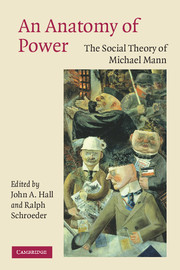Book contents
- Frontmatter
- Contents
- List of figures
- List of contributors
- 1 Introduction: the IEMP model and its critics
- Part I Theory, practice, method
- Part II Types of power
- Part III European exceptionalism?
- Part IV Promise and perils of modernity
- 13 The ‘British’ sources of social power: reflections on history, sociology, and intellectual biography
- 14 Networks and ideologies: the fusion of ‘is’ and ‘ought’ as a means to social power
- 15 Mann's dark side: linking democracy and genocide
- Part V Response
- Bibliography of Michael Mann's Writings
- Index
- References
13 - The ‘British’ sources of social power: reflections on history, sociology, and intellectual biography
Published online by Cambridge University Press: 22 September 2009
- Frontmatter
- Contents
- List of figures
- List of contributors
- 1 Introduction: the IEMP model and its critics
- Part I Theory, practice, method
- Part II Types of power
- Part III European exceptionalism?
- Part IV Promise and perils of modernity
- 13 The ‘British’ sources of social power: reflections on history, sociology, and intellectual biography
- 14 Networks and ideologies: the fusion of ‘is’ and ‘ought’ as a means to social power
- 15 Mann's dark side: linking democracy and genocide
- Part V Response
- Bibliography of Michael Mann's Writings
- Index
- References
Summary
Britain performs a unique function in Michael Mann's presentation of the dynamics that made the modern world. It stands out, first, as the society that invented a modern state and modern capitalism in the eighteenth century, and then pioneered a viable model of modernization in the following century: a liberal-reformist system, fusing old regime and capitalist middle classes, and later complemented by welfarism. The British model in The Sources of Social Power anticipates the patches of light shed by the ‘cultural solidarity’ of the northwest European liberal democratic bloc in the twentieth century in the dark story of Fascists and The Dark Side of Democracy (Mann 1986; 1993; 2004; 2005). Through British history Mann traces what is to him the single most important source of the reordering of power in the modern world: the development of the fiscal-military state. It is the eighteenth-century fiscal-military state which produces the interdependence between the global and domestic dimensions of change. It is the state's international actions and the resulting tax burden that politicize people at home and which prestructure the old regime's liberal strategy of modernization. In the nineteenth century, it is a liberal state which drives the ‘national caging’ of social groups, and which preserves the military, diplomatic and financial power of old aristocratic and new financial elites, causing the crisis of 1914.
- Type
- Chapter
- Information
- An Anatomy of PowerThe Social Theory of Michael Mann, pp. 285 - 305Publisher: Cambridge University PressPrint publication year: 2006
References
- 1
- Cited by



